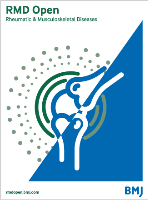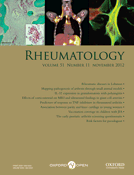
RMD Open
Scope & Guideline
Transforming patient care through innovative research.
Introduction
Aims and Scopes
- Rheumatic Disease Mechanisms:
Research exploring the underlying mechanisms of rheumatic diseases, including immunological, genetic, and environmental factors that contribute to disease onset and progression. - Clinical Trials and Treatment Efficacy:
Studies evaluating the efficacy and safety of various treatment modalities, including traditional disease-modifying antirheumatic drugs (DMARDs), biologics, and targeted therapies, in real-world settings. - Patient-Centered Outcomes:
Research focusing on patient-reported outcomes, quality of life assessments, and the psychosocial impact of rheumatic diseases, aiming to enhance patient care and treatment strategies. - Biomarkers and Diagnostic Tools:
Development and validation of biomarkers and imaging techniques to improve diagnosis, monitor disease activity, and predict treatment responses in rheumatic diseases. - Epidemiology and Public Health:
Investigations into the prevalence, incidence, and healthcare burden of rheumatic diseases, including the effects of socioeconomic factors and health disparities. - Innovations in Care Delivery:
Research on novel care models, including telemedicine and self-management strategies, aimed at improving access to care and patient engagement in the management of rheumatic diseases.
Trending and Emerging
- Targeted and Personalized Therapies:
An increasing emphasis on the efficacy of targeted therapies, particularly JAK inhibitors and biologics, tailored to individual patient profiles, is evident in recent studies. - Impact of Comorbidities:
Research exploring the interaction between rheumatic diseases and comorbid conditions, particularly cardiovascular diseases and metabolic disorders, is gaining traction, highlighting the importance of comprehensive patient management. - Longitudinal and Real-World Data Studies:
There is a growing trend towards utilizing longitudinal studies and real-world data to assess treatment effectiveness and disease progression in diverse populations. - Digital Health and Telemedicine:
The integration of digital health solutions and telemedicine into rheumatology practice has emerged as a significant theme, especially in response to the COVID-19 pandemic, with studies focusing on their efficacy and patient acceptance. - Psychosocial Aspects of Rheumatic Diseases:
Increasing recognition of the psychosocial impact of rheumatic diseases on patients, including mental health outcomes and quality of life, is reflected in the growing number of publications addressing these issues.
Declining or Waning
- Traditional Therapeutic Approaches:
There seems to be a waning interest in studies solely focused on traditional DMARDs, as the field shifts towards exploring newer biologics and targeted synthetic therapies. - Solely Laboratory-Based Research:
Research that is primarily laboratory-based, without direct clinical implications, is less frequently published, indicating a shift towards studies with clear translational value. - Generalized Pain Management Strategies:
Broad approaches to pain management that do not specifically address the unique needs of rheumatic disease patients are becoming less common, as the focus shifts towards personalized and disease-specific interventions.
Similar Journals

Open Access Rheumatology-Research and Reviews
Pioneering Open Access Research in Rheumatology.Open Access Rheumatology-Research and Reviews, published by DOVE MEDICAL PRESS LTD, is a distinguished journal that has been a vital part of the rheumatology field since its inception in 2009. With an ISSN of 1179-156X, this journal is dedicated to disseminating groundbreaking research and comprehensive reviews in the discipline of rheumatology, making it an essential resource for researchers, clinicians, and students alike. It boasts an impressive Q3 ranking in the Rheumatology category for 2023, reflecting its relevance and quality within a highly competitive landscape, where it ranks in the 51st percentile among its peers as indicated by the Scopus Ranks. As an open-access platform, it ensures that critical findings and insights are easily accessible to a global audience, promoting collaboration and knowledge sharing. The journal's scope includes a wide range of topics within rheumatology, aimed at advancing understanding and treatment of musculoskeletal disorders and autoimmune diseases. Its headquarters is located in New Zealand, positioning it as a key player in the international research community.

International Journal of Rheumatic Diseases
Fostering breakthroughs in rheumatic disease research.The International Journal of Rheumatic Diseases, published by WILEY, serves as a crucial platform for disseminating high-quality research and advancements in the field of rheumatology. With an ISSN of 1756-1841 and an E-ISSN of 1756-185X, this journal has established itself within the academic community since its inception in 2008, and it is set to continue until at least 2024. Positioned in the Q3 category of rheumatology, the journal holds a significant rank of #38 out of 73 in its field according to Scopus, showcasing its growing influence despite the competitive environment. The absence of Open Access reflects a traditional scholarly publishing model, allowing for meticulous peer-review processes to ensure the rigor and reliability of published studies. This journal aims to foster innovative research, critical reviews, and clinical studies, thereby contributing to a deeper understanding of rheumatic diseases and enhancing patient care. The dedicated readership, including researchers, healthcare professionals, and students, will find valuable insights into the latest findings and methodologies relevant to rheumatology in the journal's comprehensive articles.

Reumatologia
Exploring innovative methodologies in rheumatic diseases.Reumatologia is a dedicated open-access journal published by TERMEDIA PUBLISHING HOUSE LTD that has been serving the global scientific community since 2005. The journal focuses on the fields of Rheumatology, Immunology, and Allergy, providing a rich platform for researchers and practitioners to share innovative findings, clinical insights, and methodologies. With its roots tracing back to the early 1960s and a steady convergence of quality content through 2024, Reumatologia has secured a place in the academic landscape, currently holding a Q4 rating in Immunology and a Q3 rating in both Immunology and Allergy and Rheumatology categories for 2023. While the journal ranks #42 out of 73 in the Medicine - Rheumatology category, its open-access model ensures that research is widely disseminated, enhancing visibility and accessibility to vital knowledge that shapes therapeutic practices. Located in Poznan, Poland, Reumatologia remains a pivotal source of credible research, fostering collaboration among academics, healthcare professionals, and students internationally.

Gastrointestinal Disorders
Empowering Professionals with Cutting-Edge GI ResearchGastrointestinal Disorders is a prominent open-access journal published by MDPI, based in Switzerland, that focuses on the latest research and innovations in the fields of gastroenterology, hepatology, and immunology. Since its inception in 2019, the journal has provided a vital platform for researchers and professionals to disseminate their findings, engaging with a global audience keen on advancing knowledge in gastrointestinal health. With a dedicated commitment to high-quality, peer-reviewed articles, Gastrointestinal Disorders has gained recognition in 2023, achieving Q3 status in gastroenterology and notable rankings in several other categories, including a respectable position in the quartiles for hepatology, immunology, and oncology. Despite its recent establishment, the journal has quickly become a valuable resource, facilitating open access to critical insights in the study of gastrointestinal diseases and their management, ensuring that emerging research is readily available to inform clinical practice and educate future professionals.

RHEUMATIC DISEASE CLINICS OF NORTH AMERICA
Unveiling innovations in rheumatic disease management.Rheumatic Disease Clinics of North America is a premier journal published by W B Saunders Co-Elsevier Inc, dedicated to advancing the field of rheumatology through comprehensive and impactful research. With an ISSN of 0889-857X and an E-ISSN of 1558-3163, this esteemed publication has been disseminating knowledge since its inception in 1987, and continues to guide clinicians and researchers alike through its insightful articles and case studies. Positioned in the 2023 Q2 quartile for Rheumatology, it ranks #31 out of 73 journals in the Scopus category of Medicine _ Rheumatology, reflecting a commendable impact factor and relevance in the academic community. Although it does not offer open access options, the journal ensures that subscribers have access to cutting-edge research and reviews that address contemporary challenges and advancements in rheumatic disease. With its authoritative content, Rheumatic Disease Clinics of North America serves as a vital resource for those striving to improve patient care and clinical outcomes in the ever-evolving landscape of rheumatology research.

Current Rheumatology Reviews
Exploring breakthroughs in rheumatology advancements.Current Rheumatology Reviews is an esteemed journal dedicated to publishing comprehensive reviews on advancements in the field of rheumatology. Established by Bentham Science Publishers, this journal has become a vital resource for researchers, clinicians, and students seeking to stay abreast of the latest developments and therapeutic strategies from 2006 to 2024. Located in the United Arab Emirates, it caters to a global audience, delivering insights that have been pivotal in shaping clinical practices. With an impact factor reflective of its Q3 status in Rheumatology by 2023, the journal ranks #46 out of 73 in the Scopus database, positioning it in the 37th percentile in the discipline. Although it operates without open access, its high-quality content ensures that each article undergoes rigorous peer review, making the Current Rheumatology Reviews a trusted platform for disseminating critical research findings and reviews that drive forward the understanding and treatment of rheumatic diseases.

RHEUMATOLOGY
Innovating Care Through Groundbreaking Pharmacology InsightsRHEUMATOLOGY, published by Oxford University Press, is a leading journal in the fields of Pharmacology and Rheumatology, recognized for its significant contribution to advancing the understanding and treatment of rheumatic diseases. With an impressive impact factor and ranking within the top quartiles for both medical pharmacology and rheumatology, this journal serves as an essential resource for researchers, clinicians, and healthcare professionals. The journal spans an extensive publication history, with contributions from 1952 to 1995 and from 1998 to 2024, reflecting its enduring commitment to disseminating high-quality research. The Open Access option allows for broader dissemination of knowledge, enhancing the visibility of groundbreaking studies. Positioned in the United Kingdom, RHEUMATOLOGY not only offers valuable insights into the latest therapeutic advancements and clinical guidelines but also fosters collaboration across disciplines, ensuring that practitioners stay at the forefront of innovation in the management of rheumatic conditions.

RHEUMATOLOGY INTERNATIONAL
Exploring the forefront of rheumatology research.Rheumatology International, published by Springer Heidelberg, is a prestigious journal that focuses on innovative research in the field of rheumatology and immunology. Established in 1981, this peer-reviewed journal has contributed significantly to advancing our understanding of autoimmune disorders, clinical approaches, and therapeutic interventions. It holds a commendable Q2 ranking in the categories of Immunology, Immunology and Allergy, and Rheumatology as of 2023, showcasing its influence and importance within these disciplines. With a robust Scopus ranking—positioned 14 out of 73 in Medicine Rheumatology—it caters to a diverse audience of researchers, clinicians, and students committed to improving patient care and treatment modalities. Although it does not currently offer open access options, the journal remains a vital resource for insights on contemporary challenges and breakthroughs in rheumatological research, published from its base in Heidelberg, Germany.

Advances in Rheumatology
To innovate, educate, and transform rheumatology.Advances in Rheumatology is a premier open-access journal published by BMC, dedicated to advancing the field of rheumatology through high-quality, peer-reviewed research. Launched in 2018, the journal has quickly established itself within the academic community, achieving a commendable Q2 ranking in the category of Rheumatology as of 2023 and ranking #34 out of 73 in the Scopus Medicine Rheumatology listings, placing it in the 54th percentile. With a focus on innovative treatments, patient care, and the latest in rheumatological research, the journal provides a platform for researchers and clinicians to disseminate their findings and foster collaborative advancements in this critical area of medicine. Recognized for its accessibility, the journal follows an open-access model, ensuring that research is freely available to a global audience. With a commitment to high standards of academic rigor, Advances in Rheumatology plays a vital role in enhancing the understanding and treatment of rheumatic diseases, making it an invaluable resource for researchers, professionals, and students alike.

CLINICAL AND EXPERIMENTAL ALLERGY
Bridging Theory and Practice in Allergy ScienceCLINICAL AND EXPERIMENTAL ALLERGY is a premier peer-reviewed journal dedicated to advancing the scientific understanding of allergy and immunology. Published by Wiley in the United Kingdom, this esteemed journal maintains a significant impact factor, reflecting its high standards and influential research contributions. With an impressive history since its inception in 1971, the journal is poised to continue leading the discourse in the field until at least 2024. It is ranked in the Q2 quartile for both Immunology and Allergy categories, further highlighting its reputable standing within the academic community. The journal's Scopus rankings showcase its academic relevance, securing the 49th and 51st positions in the Medicine and Immunology categories, respectively. Researchers, professionals, and students will find vital insights and contemporary research trends within its pages, making it an essential resource for those invested in understanding and addressing allergic diseases and disorders.